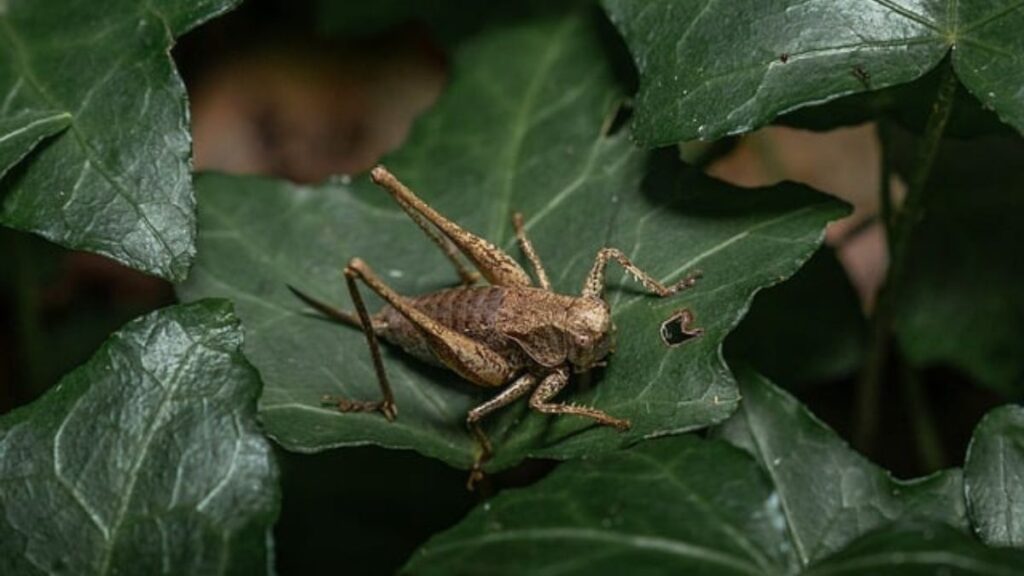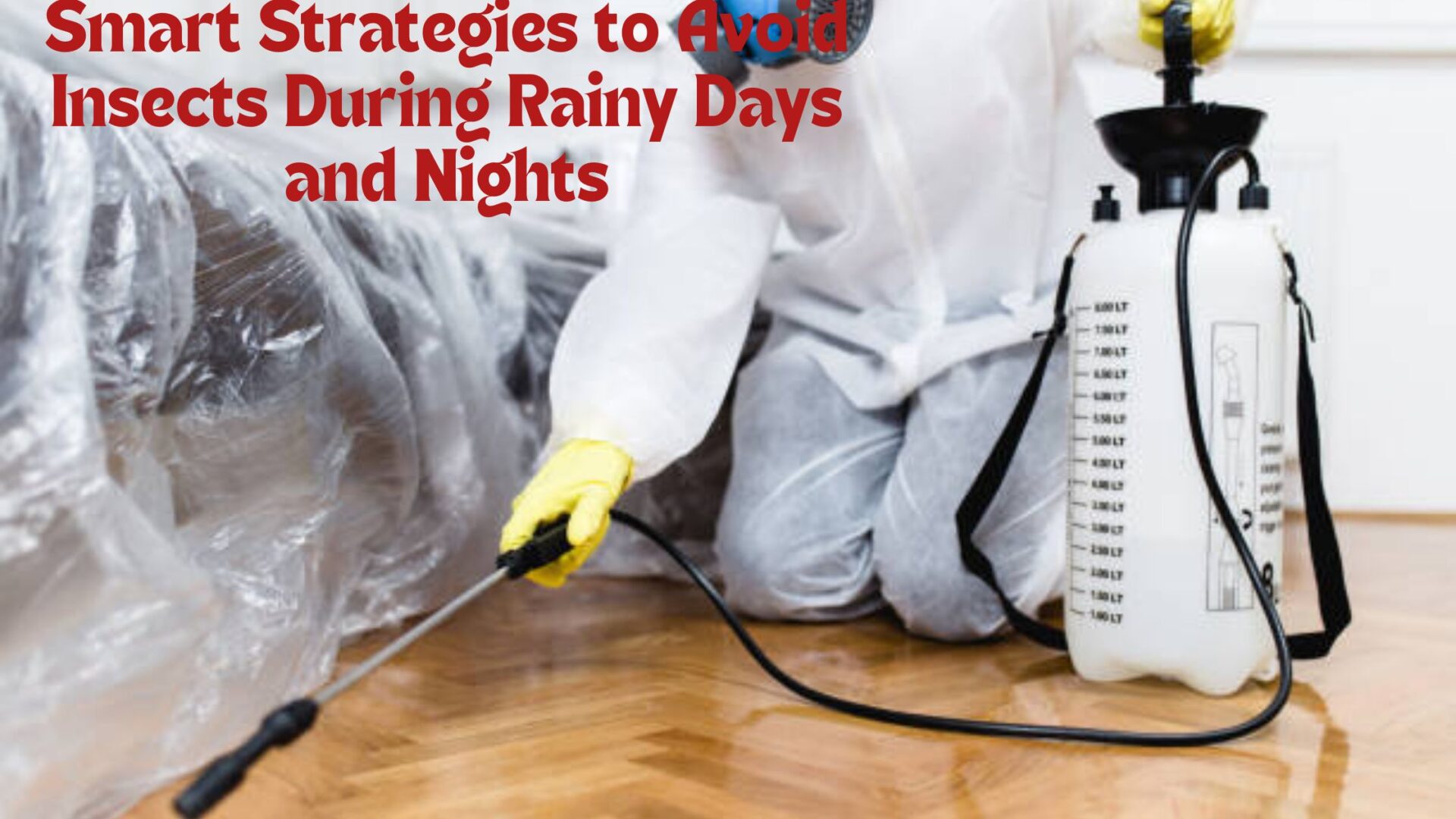Introduction:-
Smart Strategies to Avoid Insects During Rainy Days and Nights

When the rainy season arrives, the relief from the sweltering heat is accompanied by an influx of insects seeking shelter and nourishment. These pests are not simply a nuisance; they can also pose significant health risks. To maintain the comfort of your home and keep insects at bay, consider employing these clever strategies:
Smart Strategies for Avoid Insects Infestations During Rainy Days and Nights
- Seal Entry Points:
Inspect your home for gaps and cracks around windows, doors, and utility entry points. Use caulk or weatherstripping to seal these openings, blocking insects from entering your living space. - Maintain a Clean Environment:
Keep your home clean to deter insects. Regularly wipe down surfaces, vacuum, and take out the trash. Pay special attention to the kitchen, where food particles can attract pests. - Utilize Natural Repellents:
Certain plants and essential oils have natural insect repellent properties. Mix lavender, peppermint, or eucalyptus oils with water and spray around entry points. Planting herbs like basil, mint, and rosemary near windows and doors can also repel insects. - Install Protective Screens:
Install mesh screens on windows and doors to create an effective barrier against insects. Ensure that the screens are in good condition to prevent tears or holes that could allow insects to enter. - Control Moisture Levels:
Insects thrive in moist environments. Use dehumidifiers in damp areas to reduce humidity levels. Fix any leaks promptly and ensure proper ventilation in bathrooms and kitchens to minimize moisture buildup. - Minimize Outdoor Lighting:
Insects are attracted to light. During rainy nights, turn off outdoor lights or use yellow bug lights that are less appealing to insects. Additionally, close curtains or blinds to prevent indoor lights from drawing bugs to your windows. - Store Food Properly:
Keep food in airtight containers to avoid attracting insects. This includes pet food, which should be stored securely when not in use. Clean up any spills immediately to eliminate potential food sources for pests. - Employ Insect Traps and Baits:
Strategically place insect traps and baits around your home to catch and eliminate pests. There are various traps available for different types of insects. Follow the instructions carefully for optimal results. - Consider Regular Pest Control Treatments:
During the rainy season, consider regular pest control treatments. Professional services can provide targeted treatments that are safe for your family and pets, effectively reducing the insect population in and around your home. - Maintain Your Yard:
Maintain your yard to prevent insects from breeding and entering your home. Trim bushes and trees, remove standing water, and keep your lawn mowed. Dispose of yard waste promptly and ensure that gutters and downspouts are clear of debris to prevent water accumulation.
Why Insects Seek Refuge Indoors During Rain:
During rainy periods, insects frequently seek shelter indoors for various reasons:

- Element Protection: Rain poses threats to insects through drowning or habitat disruption. Indoors, they find a dry and secure environment.
- Temperature Regulation: Rain often brings cooler temperatures. Insects move indoors, as these areas offer a more stable and warmer environment during a rainstorm.
- Hunting and Foraging: Some insects use rainy periods as an opportunity to hunt for food and explore new foraging grounds that might be less accessible in wet conditions.
- Predator Avoidance: Predators of insects, such as birds and amphibians, become more active during and after rainfall. Seeking shelter indoors helps insects evade these predators.
- Migration and Displacement: Heavy rain can displace insects from their normal habitats, prompting them to seek shelter. Indoor spaces offer a convenient and suitable refuge.
In summary, insects are driven to move indoors during rainy weather to stay dry, safe, and warm, while also taking advantage of possible food sources and protection from predators.
Common Mistakes to Avoid when Preventing Rainy Day Insects
When it rains, insects often seek shelter indoors, and it’s essential to avoid making mistakes that could inadvertently invite them into your home:
- Overlooking Small Openings: Tiny cracks and gaps around doors, windows, and the foundation can serve as entry points for insects. Regularly inspect and seal all potential entry points to keep them out.
- Neglecting Screen Maintenance: Damaged or torn door and window screens can provide easy access for insects. Regularly check screens for holes and tears and repair or replace them promptly.
- Reliance on Harsh Chemicals: Overusing chemical insecticides can harm humans and pets and may not effectively address the root cause of the infestation. Opt for natural repellents and preventive measures instead.
- Leaving Food and Trash Exposed: Insects are attracted to food and trash. Keep food sealed, clean up crumbs and spills immediately, and ensure trash cans are tightly closed and regularly emptied.
- Ignoring Standing Water: Accumulated water indoors or around the home’s perimeter can attract insects. Fix leaks, empty standing water, and ensure proper drainage to eliminate potential breeding grounds.
- Ineffective Use of Natural Repellents: Simply placing natural repellents like essential oils or citrus peels without refreshing them regularly can reduce their effectiveness. Reapply as needed to maintain their potency.
- Overwatering Indoor Plants: Excess moisture from overwatering indoor plants can attract insects. Ensure proper drainage and avoid overwatering to create a less inviting environment.
- Poor Lighting Choices: Bright outdoor lights can attract insects to your home’s entry points. Switch to yellow or sodium vapor lights, which are less attractive to insects.
- Cluttered Areas: Clutter in basements, attics, and garages provides hiding spots for insects. Keep these areas clean and organized to minimize insect harborage.
- Ignoring Outdoor Factors: Overgrown vegetation or debris near the home’s foundation can attract insects. Maintain your yard and keep vegetation trimmed back from the house to reduce the risk of insect infestation.
By avoiding these common mistakes and implementing effective preventative measures, you can significantly reduce the likelihood of insects entering your home during rainy days.
Effective DIY Methods for Keeping Insects Away During Rain:
During rainy weather, insects can become a nuisance. Luckily, there are several effective DIY methods you can use to keep them away from your home:

- Seal Entry Points: Inspect your home’s exterior for any cracks, gaps, or openings around doors, windows, and the foundation. Use caulk or weatherstripping to seal these entry points, preventing insects from getting inside.
- Utilize Screens: Ensure that all windows and doors have properly fitted screens without tears or holes. This allows for ventilation while keeping insects out.
- Maintain Cleanliness: Keep your home clean, especially in the kitchen, to avoid attracting insects with food crumbs and spills. Regularly remove trash and eliminate any standing water.
- Employ Natural Repellents: Use natural insect repellents such as essential oils. For instance:
- Peppermint Oil: Mix a few drops with water in a spray bottle and use it around entry points.
- Lavender Oil: Place lavender sachets in strategic areas as it acts as a repellent for many insects.
- Citrus Peels: Place lemon or orange peels around windowsills and doorways.
- Borax and Sugar: Mix borax with sugar and place it in areas where you notice insects. The sugar attracts them, while the borax kills them. Exercise caution if you have pets or children.
- Diatomaceous Earth: Sprinkle food-grade diatomaceous earth around entry points and areas where insects are likely to enter. This natural powder is harmless to humans and pets but deadly to insects.
- Herbs and Plants: Plant insect-repelling herbs and plants around your home, such as basil, mint, and marigolds. These can help deter insects from coming indoors.
- Consider Lighting: Insects are attracted to light, so opt for yellow or sodium vapor light bulbs outside, as they are less appealing to insects.
By implementing these DIY techniques, you can significantly reduce the number of insects that enter your home during rainy weather, creating a more comfortable and pest-free environment.
Conclusion
To ensure a comfortable and bug-free living space during the rainy season, proactive pest prevention strategies are essential. By embracing these smart tactics, you can enjoy rainy days and nights without the hassle of dealing with insects. Maintain a clean and comfortable home by regularly implementing these practices as part of your routine. Stay vigilant to keep insects at bay throughout the rainy season.
References
- “Bug-Proof Your Home: A Comprehensive Guide” – Good Housekeeping
- “Seal Up Your Home to Keep Bugs Out” – Bob Vila
- “Home Cleaning Tips to Deter Pests and Maintain a Healthy Environment” – Terminix
- “Home Maintenance: Cleaning Strategies to Prevent Pest Infestations” – Orkin
- “Natural Insect Repellents: Eco-Friendly Solutions for Pest Control” – Healthline
- “Essential Oils: A Guide to Using Them for Insect Repellency” – Verywell Health
- “Window Screens: The Benefits of Installing Them for Pest Control” – This Old House
- “Insect Screens: The Ultimate Solution for Keeping Bugs Out” – Pella
- “Moisture Control in Your Home: Preventing Pests Through Effective Humidity Management” – PestWorld
- “Dehumidifiers: An Essential Tool for Pest Control in Your Home” – HomeServe








